I’ve given them time to ship out multiple story arcs, find their footing and sketch out whatever themes and big ideas they’re aiming for. But there’s no denying it any more: The X-Men line just isn’t exciting nowadays.
For years, the X-Men books burned as the molten, superheated core of the Marvel Universe. Co-created by Stan Lee and Jack Kirby, the original X-Men series took the nerve-wracking chrysalis of adolescence and shot it through with superhero energy and angst. Even as new characters were introduced and founding members got older, the X-titles operated on a premise that made them ripe to be read as metaphor. If you felt like society pushed you aside or said that your kind of people was worthless, then an X-Men comic spoke to you in a special way. Moreover, the various series in the X-family continually boiled with simmering sexual tension, star-crossed romance and existential hand-wringing. Characters drank, smoked, hooked up and moped in X-Men comics. They were cool, sexy and dangerous and often acted like they knew it.
It’s no coincidence that the first X-Men movies from the early 2000s leaned heavily on that combination of elements. But lately the heat from the X-Men comics has died down to imperceptible levels. Since the All-New, All-Different Initiative that relaunched a new iteration of the Marvel Universe, there’s been a new status quo for mutantkind.
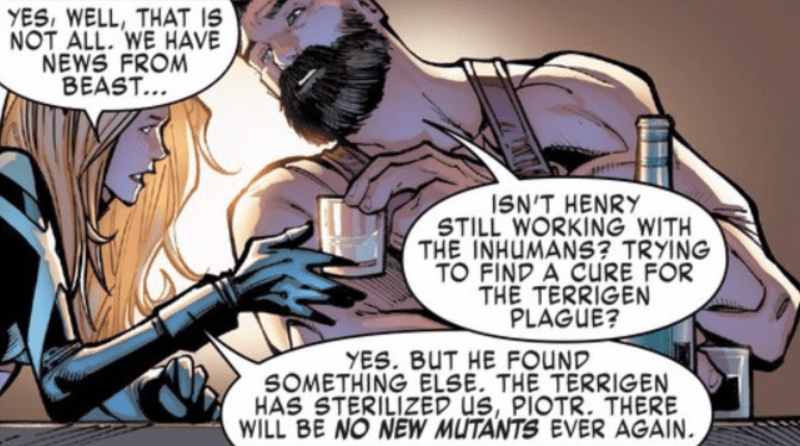
A wandering cloud of Terrigen mist — which unlocks genetic volatility seeded by long-ago extraterrestrial experimentation — is killing mutants, while growing the ranks of the superpowered offshoot species called Inhumans. This phenomenon is also sterilising those mutants who are still alive. The three main X-titles on offer from Marvel all deal with this bleak reality. Extraordinary X-Men features a Storm-led contingent of heroes based out of Limbo who are trying to nurture and protect what’s left of the mutant race. All-New X-Men is built around the younger, time-displaced original five X-Men and others road-tripping across the world and trying to write their own futures in a future they never made. Uncanny X-Men has Magneto leading a team of rogues and killers who are taking extreme, sometimes lethal measures to stop the enemies of mutant-kind.
The thematic set-up is the same and the current Homo Superior status quo — mutants stand at the brink of extinction and the X-Men constantly battle for the whole future of their whole species — is an oft-used framework for latter-day X-narratives. The familiarity isn’t the problem, though. It feels like some special ingredient is missing from the current X-recipe. The X-Men are present in the Marvel Universe. We see them in big crowd scenes in Civil War II and they have tie-in series and pivotal roles connected to Marvel’s latest blockbuster crossover.
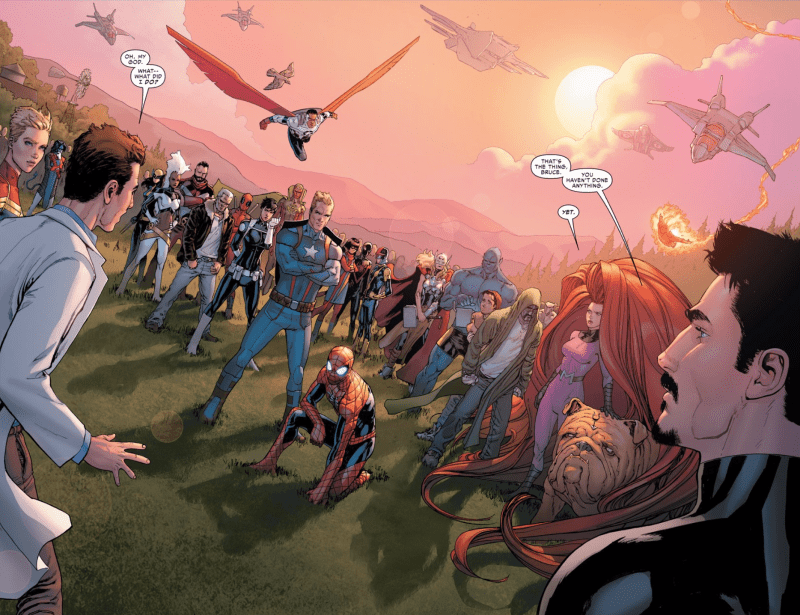
But, in a more meaningful way, they’re also absent.
The various Avengers and Inhuman teams either have interactions with mutants or mutant members on their rosters but the larger fate of mutant-kind doesn’t seem to concern non-mutant heroes. In Uncanny Avengers, New Avengers or other titles with integrated rosters that have mutants, Sunspot or Rogue will cough or shudder ominously as a reminder that mutants are dying. Their lingering fatal illness is a result of the release of the Terrigen Cloud that’s transforming normal folks into Inhumans.
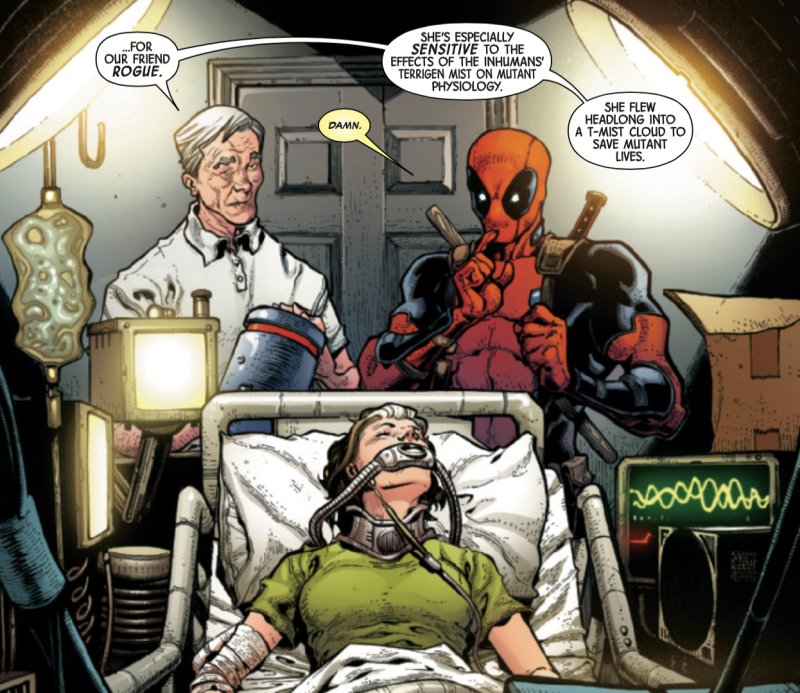
Someone will look on worryingly but that’s the extent of concern shown towards their teammates and the offshoot of humanity they belong to. Thematically, we’ve been here before. When the Legacy Virus threatened the lives of mutants in melodramatic storylines from the 1990s, the proceedings were mainly contained to the X-books proper. This time, the new status quo of mutants dying out is a narrative pillar of the newest iteration of the Marvel Universe but it feels like no one really cares. The continued existence of Homo Superior is only a going concern in the X-books.
In the past, the fate of mutant-kind has been the storytelling axis for universe-wide events like Avengers Vs. X-Men. Even when it hasn’t been central to the larger fictional construct, X-drama has highlighted the best things about Marvel’s approach to superhero genre work. I read and re-read a bunch of older X-Men comics last week, starting with the excellent 2009 New Mutants series written by Zeb Wells — which, man, is criminally underrated — and sampling various chapters of the X-Men: Second Coming crossover. These comics came out during a time when I’d drifted away from the X-books but I found everything I liked about Marvel’s mutant melodrama executed to a high degree. The tone is desperate and electric and the stakes rose even higher thanks to in-fighting and philosophical clashes. Despite the dwindling numbers of the larger mutant population, the X-Men enterprise felt like a huge, well-oiled machine with a strong persona driving the collective agenda. They also still felt like a family.
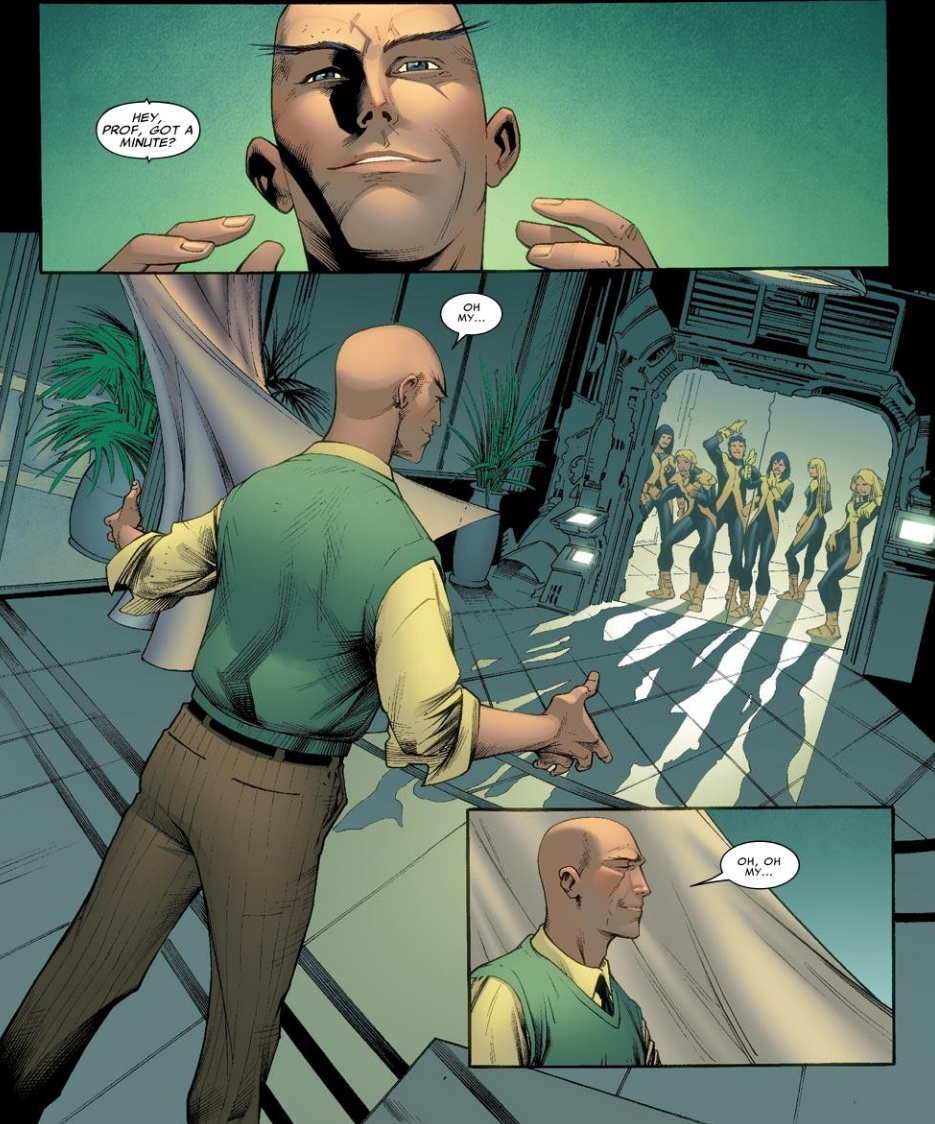
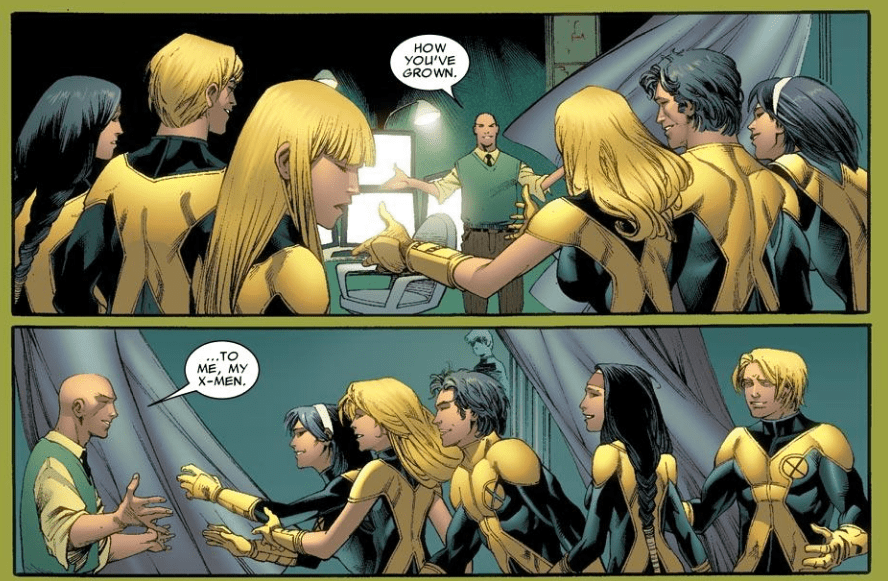
The end result was both an inflection point and a reassurance that there was still life in those X-genes. But the current X-offering comes across as a flatline.
As seductive as the Hollywood-centric conspiracy theories are, it’s counter-intuitive to think that Marvel wants the X-Men concept to fail in its publishing division. No matter who has the film rights to Cyclops, Wolverine, Storm and the rest, the X-Men are still owned by Marvel. A weak X-line does them no favours and intentionally torpedoing the performance of that corner of their universe because of Hollywood media rights would cost them more money than it would Fox. Besides, Marvel’s got great talent on the books — but by and large, but the cylinders don’t seem to be firing.
Every so often, there are individual character moments that land well in a particular issue; however, in the main, the thrill of reading Marvel’s mutant-centric comics has faded. I’m still enjoying the odd moment or line of dialogue but the aggregate offering doesn’t feel like must-read material anymore. Inside the fiction, the X-Men apparatus feels dysfunctional. The most fetching iterations of the franchise always had a base level of competency that made them seem formidable. All those Danger Room training sequences and coded manoeuvres were a secondhand language designed to communicate that Chuck’s crew would kick your arse in the name of peaceful coexistence. And yeah, there’d be challenges that would take the X-teams to their limits but that made it all the more satisfying when they won in surprising ways. Nowadays, the X-collective feels so ragtag and up against the wall, it’s hard for a reader to pinpoint what they’re good at any more.
One aspect of it might be that the philosophical allure of the X-books has dulled. Cyclops wound up becoming the central personality of mutant-kind, pulling together their remnants into a small, defiant nation about a decade back. Even after his personality was written towards harsh extremism and he killed Professor X, he was still the irresistible vector that made mutants feel unpredictably dangerous. But Scott Summers died in an as-yet-undisclosed encounter with the Inhumans and the new X-Men status quo doesn’t really have a figure like that any more. The younger version of Cyclops doesn’t want that failed martyrdom to become his future and the integration-vs-separatism debate has frittered away.
So, the older version of the man who succeeded, diverged from and then killed Professor X is off the stage and no one’s really filling the void. Magneto’s leading a ruthless team of killers in Uncanny X-Men but doesn’t embody the grandiose messianic tendencies that made him feel so seductive and frightening in the X-franchise’s glory days. Charles Xavier remains dead, with the telepathic parts of his brain transplanted into the Red Skull to give the Nazi supervillain control over peoples’ minds. Once Magneto became an ally of Cyclops’ single-minded caretaking of the surviving mutants, the ideological dialectic that generated intensity for the classic X-Men status quo died out. You could call that successful franchise evolution in that it’s an actual instance of meaningful change; however, there’s been nothing else as compelling to replace it. The years of feuding between different factions and schools led by Cyclops and Wolverine had some great moments but that eventually ended. The interconnectedness that was once so essential to the X-franchise has withered to practically nothing and there’s no good X-argument roiling through all the books in the franchise.
The chrono-anomalous presence of the original five X-Men in their future/our present is a once-intriguing plot device introduced by Brian Bendis that’s worn out it’s welcome. Bendis teased that some mysterious force was keeping the younger versions of Cyclops, Angel, Beast, Iceman and Jean Grey from going back to their proper time but it seems like that plot thread was never resolved. More importantly, the youthful optimism that these characters were supposed to remind us of is smothered. The overall tone is pretty much “let’s try our hardest not to die”, which is pretty nihilistic.
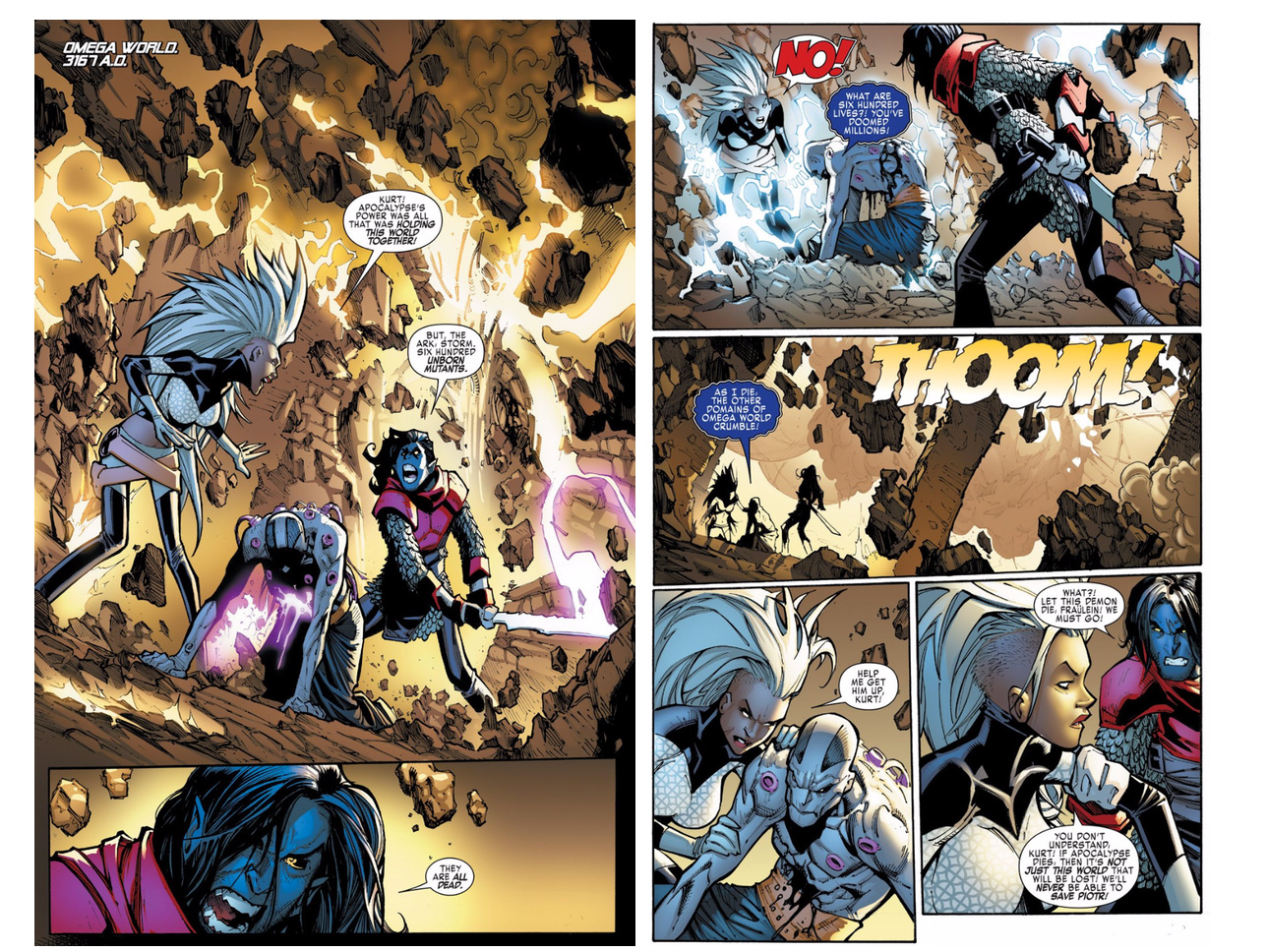
Kicked off just as the X-Men: Apocalypse movie was hitting theatres, the recent Apocalypse Wars event has come across as listless and flabby. The stories in the event don’t talk to each other in meaningful ways, furthering the idea that the sense of grand metaphor within the X-franchise is gone. Apocalypse Wars recycled plot beats in a way that felt rote instead of thrilling, like an alternate far-future where evil is dominant and the requisite “look who’s one of Apocalypse’s horsemen now!” reveal.
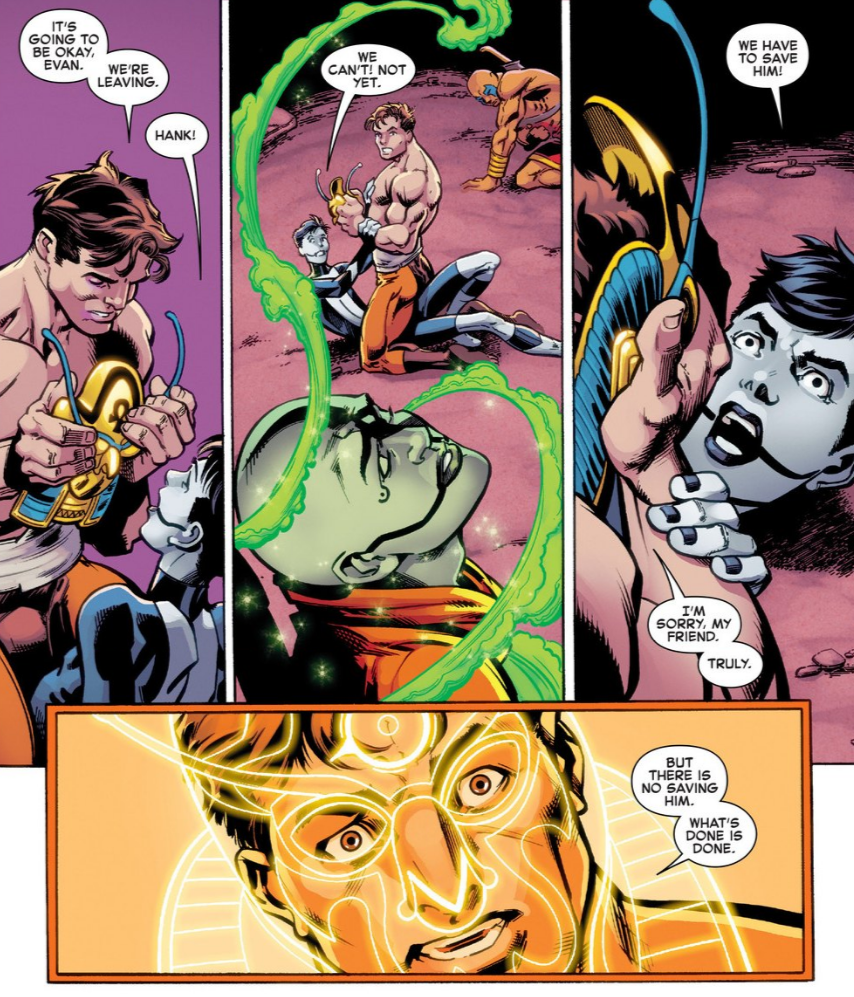
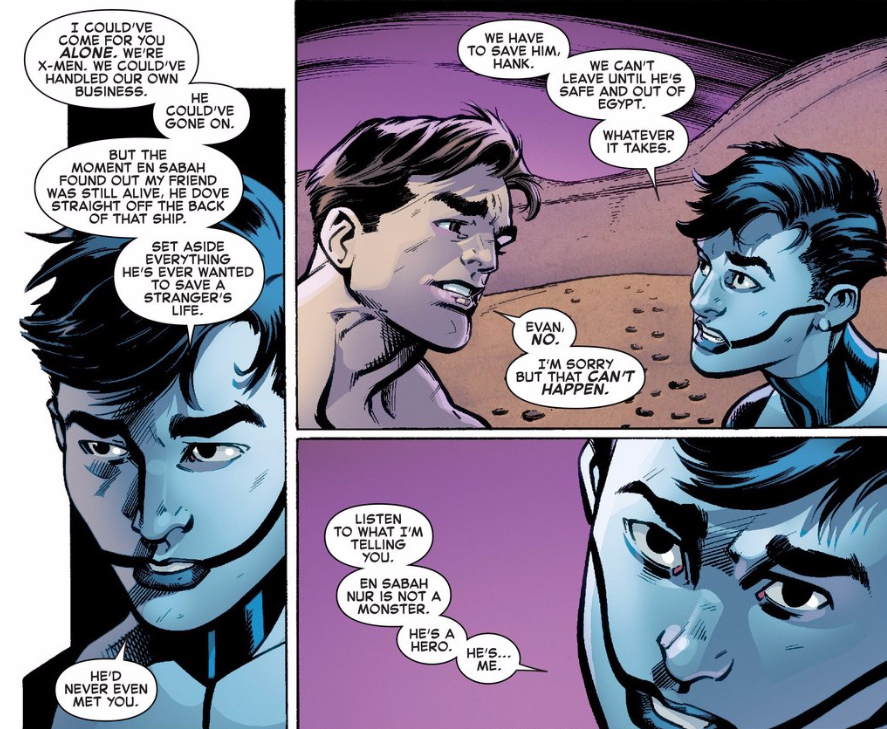
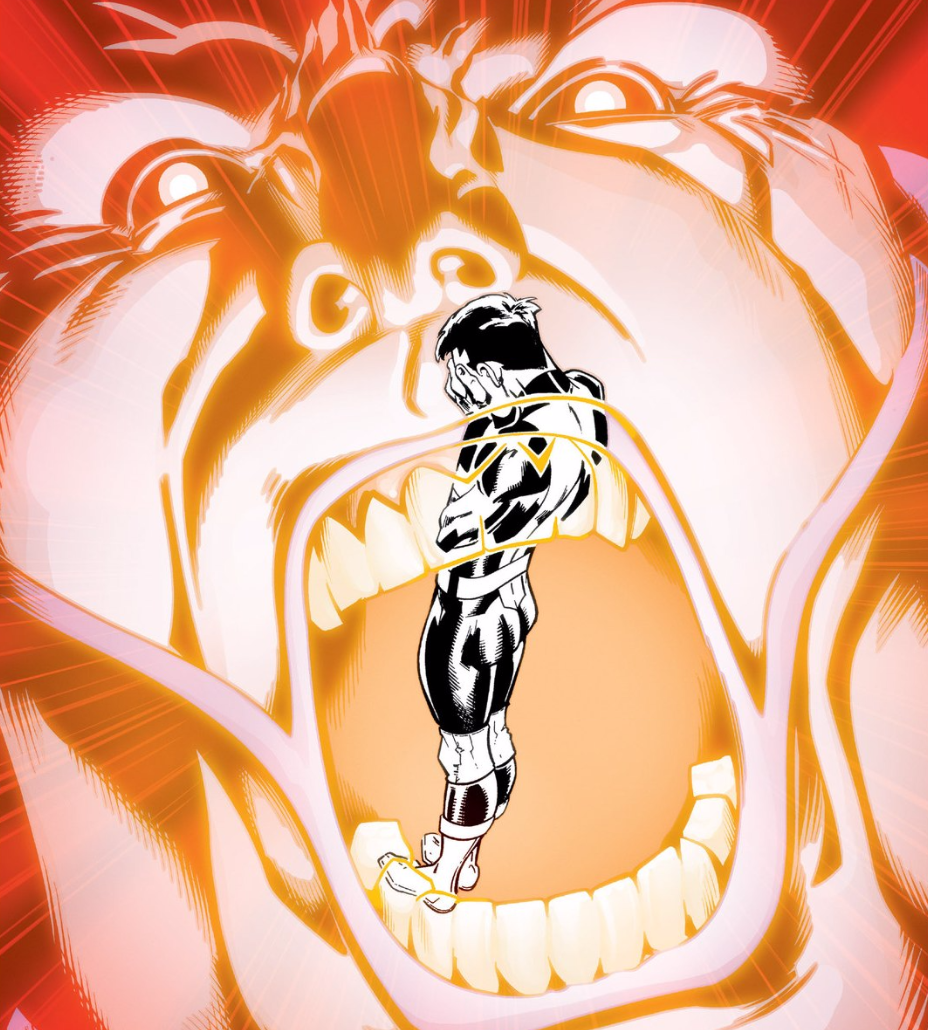
That low-thrill recycling stands as a reminder of how the most compelling recurrent plot beats in the X-Men mythos are now absent. It was practically a guarantee that you’d care when a young person’s mutant powers kick in. Longtime readers know the drill: A teenager’s normal everyday existence gets turned upside-down by the sudden manifestation of abilities that defy the laws of physics and biology. It’s almost a given that the new mutant will be hated or feared but X-gene activations remain a perfect exemplar for the allure of the X-franchise. It teases with the revelation of powers and personality. Will this new character be able to do cool stuff? Will they love or loathe their new status quo? How will they respond to the broader horizons opening up in front of them? Nowadays, that plot beat happens with characters who are becoming Inhumans. Sure, the in-fiction explanation has a different provenance but the function is the same. With the reversal of fortunes between the X-Men and Inhumans, it’s hard not to think that much more investment is happening with the latter concept — which I have some problems with, as outlined here — even if the Marvel-vs-Fox corporate conspiracy theory isn’t true.
The last X-book to really excite me like the Claremont/Byrne, Claremont/Romita Jr. output of old was Jason Aaron’s Wolverine and the X-Men. It was filled with new characters who boasted strongly realised personalities, as seen in how the innocence of Idie Okonkwo harkened back to the idealism central to Professor X’s dream. The erudite Brood hatchling fighting his alien murder instincts and the punk-rebel subversiveness of Quentin Quire both brought back the tingle of transgressiveness from when Wolverine was a misfit killer who upended the team dynamics. The new Hellfire Club, comprised of nasty rich-kid little shits, were a perfect update of the sex-club elitism of their forebears.
But the thing that I enjoyed most about Aaron’s X-Men run was how it reinvigorated the core conceit as a school for the gifted as a gateway for a future. Today, the descendants of Xavier Institute is a husk of its former self, a last redoubt hovering in Limbo for the bulk of the remaining mutants. The symbolism of a teaching institution in Limbo has likely unintended interpretations, as it reflects that the X-Men don’t have a way forward right now.
Most of the non-mutant books in Marvel’s current publishing schedule have all been presented with status quo shifts meant to reinvigorate interest. Spider-Man’s a jet-setting CEO. Wolverine is a mantle held by a woman. Dr Doom is an unscarred sorta-good guy. Daredevil has a secret identity again. Amadeus Cho is a very different kind of Hulk. While all this change hasn’t been universally lauded, it has gotten people talking. There’s very little chatter about the X-Men books, which is a weird place for the franchise that blew minds with the Dark Phoenix Saga to find itself.
Right now, the X-Men don’t feel like they have hope or a future, inside the fiction and in the real world. There’s almost certainly a narrative turnaround being planned in the X-Men stories yet to come because there always is. The challenge moving forward will be if Marvel can reignite the fire for the franchise that was once so pivotal for their success.
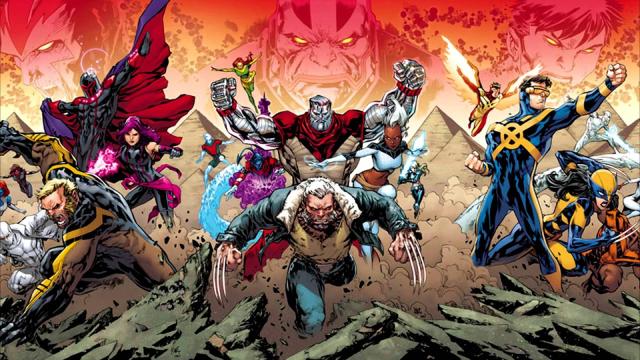
Comments
10 responses to “Why Are Marvel’s X-Men Comics So Terrible Right Now?”
All of Marvel Comics are pretty terrible at the moment.
The sudden flip around from DC being absolute shit and Marvel being amazing to Marvel bordering on shit and DC being pretty much amazing at the moment is somewhat jarring… but I have to admit, I’m digging the hell out of Rebirth!
Not all. They have some genuinely great books like Unbeatable Squirrel Girl, Unbelievable Gwenpool, Carnage, Mockingbird, Doctor Strange, Patsy Walker aka Hellcat, Moon Knight, and All-New Wolverine (just to name a few off the top of my head).
Wasn’t it cause Sony/Fox entertainment own the rights to them? and Marvel was trying to cut all ties to them (I vaguely remember reading some article Mutants were meant to be killed off in Marvel universe and be replaced with Inhumans or something)
Hell as much as I love the X-men books and universe, thought X-men Apocalypse was starting to push the boundaries as how far it can go, it was borderline for me being likable and “whats happening on screen now … whos that … and whos that”
Ever since bendis jumped off the x books and they all shifted creative teams not one of them has held my attention. Not to say bendis had a killer run but the quality has been dipping ever since unfortunately.
The only comics i ever read seriously was X-men. The may not deliberately torpedo them but they aren’t really trying that hard to put them in the limelight. My x-men fixes are feeling mediocre these days..
Title should read “Why are 90% of core comics bad right now?” and the simple answer would be Dramaaaa…
Maybe because there is to much time spent addressing the concerns of those who are on the pyramid of oppression (i.e. social justice warrior types).
The whole X-Men line needs a reboot. Hopefully we’ll get something like that out of the Inhumans vs. X-Men event (which I hope to God the Inhumans lose because I cannot stand them, at all).
Here are the three things the line needs:
-Moral leadership. Bring back Xavier or Cyclops, or have someone else step into their shoes, but the X-Men need a leader with a philosophy more complex than “don’t die”.
-Give them a home. Doesn’t matter if it’s Westchester, San Fransisco or Australia, the X-Men need their own place where they all belong.
-A sense of hope for the future. The X-Men don’t work when they’re the last of a dying people.
Yeah the X-Men comics have been spiralling for a good few years now. The last time I could read them was before Marvel Now started and Rememder and Gillen (and even Aaron) were on the franchise, but then they totally villainised Cyclops, and Wolverine was over-saturated at that point. Then they killed Wolverine (which was actually a pretty good story) and they tried to make the Inhumans the new X-Men, unsuccessfully (despite the Inhuman books being good). Bendis came in and gave us a terrible flagship X-Men title (with amazing art and a good few first issues before it devolved into absolute filler), and the X-Men have been in a terrible place ever since. And even when I was able to read them pre-Marvel Now, Bendis and Marvel mandate of “No More Mutants” had turned them essentially near extinct and changed the core thematic elements what made the X-Men great. We got some good stories out of that but they really started to wear thin with what could be done with them. And now they’re completely pointless, have zero stakes in the current Marvel universe, and as a result have become mundane to read. It’s a shame. I hope they can get a good big vision-style writer like Hickman in to fix them because X-Men are the best Marvel have and instead they push the completely thematically different Avengers on us as if they can fill the niche the X-Men once did for us. Shame.
i’ve found nearly all super hero comics are just annoying for me recently, everythings been undergoing too many reboots/changes in writing staff/cross overs/movie ties ins etc etc etc
im mainly just reading non super hero stuff lately.